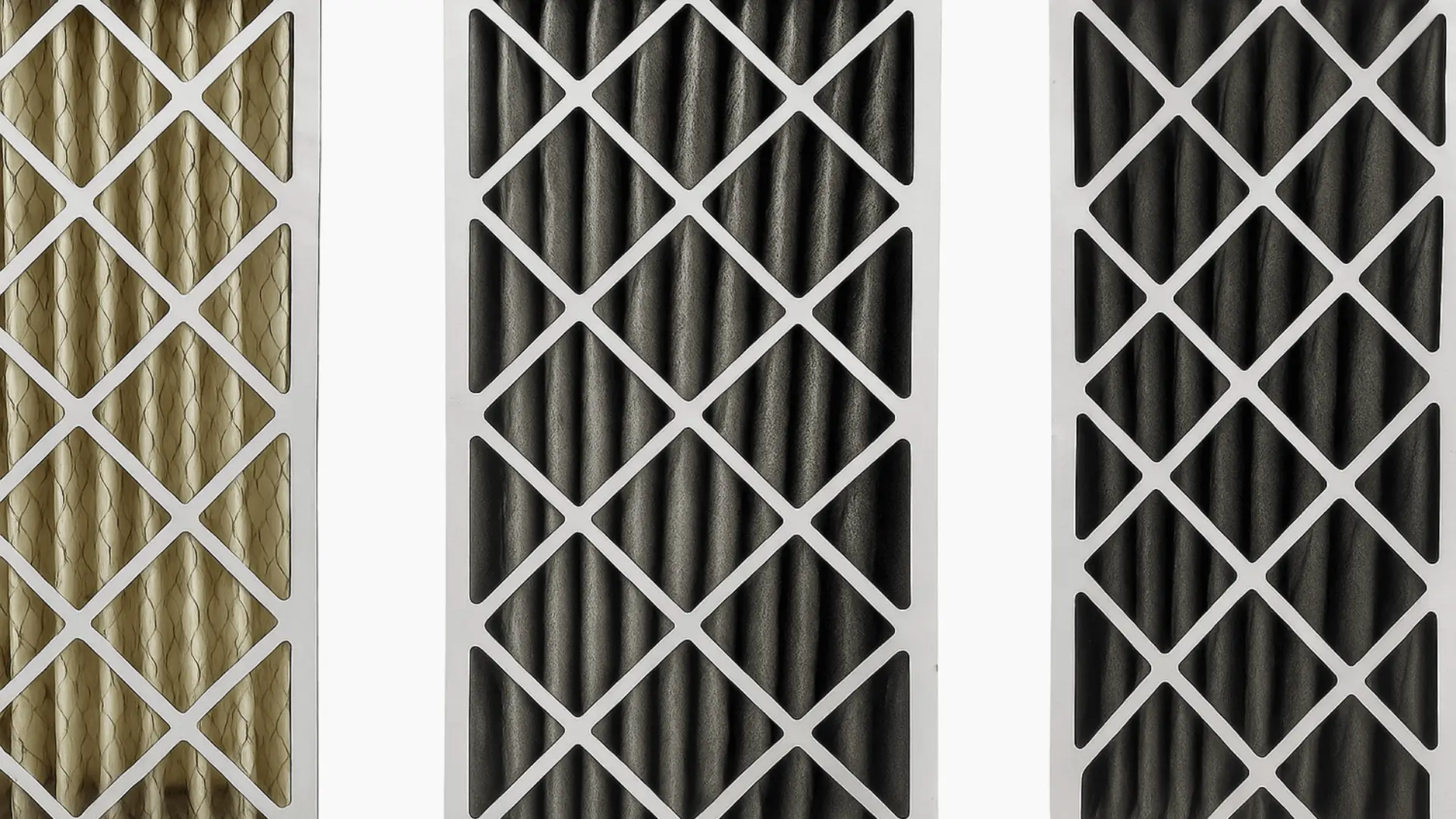One of the most common questions homeowners ask is whether upgrading to a better air filter will hurt their HVAC system. Search phrases like “does air filters restrict airflow” or “do pleated air filters restrict airflow” reflect a real concern: people want cleaner indoor air but worry that their air conditioner or furnace might struggle with restricted airflow.
The truth is that all filters restrict airflow to some degree. The real question is whether that restriction is harmful or helpful. The answer depends on the filter’s design, thickness, and brand, as well as how well it matches your HVAC system.
Do Air Filters Restrict Airflow? (The General Answer)
Yes—air filters restrict airflow, but the extent of restriction varies widely. Filters are designed to trap dust, pollen, pet dander, and other particles. To capture smaller contaminants, manufacturers use denser filter material, which naturally allows less air to pass through.
This does not automatically harm your HVAC system. In fact, moderate restriction is beneficial because it means the filter is working effectively. Problems only arise when the filter is either too restrictive for your system or when it becomes clogged due to neglect.
For example, a standard fiberglass filter has minimal restriction but also removes very few particles. A high-MERV pleated filter captures more pollutants but resists airflow more strongly. The key is balance: finding a filter that supports clean air without overworking the blower motor.
Do Thicker Air Filters Restrict Airflow?
Thicker filters—often 4 to 5 inches compared to the common 1-inch size—can seem like they would block more air. Surprisingly, that isn’t always the case. Because thicker filters have a larger surface area, they can capture particles more efficiently without necessarily creating higher resistance.
However, not all HVAC systems are designed to fit thicker filters. If your system has only a 1-inch slot, forcing in a thicker filter can reduce airflow dramatically. On the other hand, systems designed for 4-inch filters often operate more efficiently, because the filter can trap more dirt without clogging as quickly.
So, do thicker air filters restrict airflow? They can, if they don’t fit your system properly. But when installed in the right unit, thicker filters often improve both airflow and filtration performance.
For More Information: What are 3 main things the air filter is responsible for?
Do Pleated Air Filters Restrict Airflow?
Pleated filters are one of the most popular upgrades from basic fiberglass models. They are designed with folded material to increase surface area, which improves filtration. However, because the material is denser, pleated filters do restrict airflow more than fiberglass options.
The restriction isn’t always a problem. In many modern HVAC systems, pleated filters rated MERV 8 to MERV 11 strike a good balance: they capture most airborne particles without straining the blower. Higher-rated pleated filters (MERV 13 or above) may reduce airflow too much in older or undersized systems.
If you are considering pleated filters, check your system specifications. For most households, pleated filters improve indoor air quality while keeping airflow at acceptable levels.
Do Air Vent Filters Restrict Airflow?
Unlike central system filters, air vent filters are placed directly inside return or supply registers. Their goal is to capture extra dust or allergens at the room level.
While they might seem helpful, vent filters are known to restrict airflow significantly. Because vents are not designed for filtration, even a thin vent filter can reduce the volume of air moving through the ductwork. This often results in uneven heating or cooling and can increase strain on your HVAC blower.
Most HVAC professionals do not recommend vent filters. Instead, it’s better to invest in a high-quality system filter that protects your entire home without causing localized blockages.
For More Information: How Often to Replace Air Filter
Do Filtrete Filters Restrict Airflow? (Brand-Specific Insight)
Filtrete, a well-known brand from 3M, produces a wide range of filters with varying MERV ratings. Some of their higher-end filters, especially those rated MERV 12 and above, are known to restrict airflow more than standard options.
For example:
- A Filtrete MERV 8 filter provides solid protection against dust and pollen with minimal impact on airflow.
- A Filtrete MERV 13 filter captures viruses, bacteria, and smoke particles but may be too restrictive for older or low-capacity HVAC systems.
So, do Filtrete filters restrict airflow? Yes, especially at higher ratings. The key is matching the filter grade to your system. For most residential applications, MERV 8 to MERV 11 Filtrete filters are a safe choice.
For More Information: Air Filter MERV Ratings
How Much Restriction Is Too Much? Balancing Airflow and Filtration
Airflow restriction becomes a problem when:
- Your system runs longer cycles to maintain temperature.
- Rooms feel stuffy or unevenly cooled.
- Energy bills rise unexpectedly.
- The HVAC blower makes unusual noises.
Excessive restriction forces the blower motor to work harder, shortening system lifespan and wasting energy. On the other hand, too little restriction means poor air quality and dust buildup in your ducts.
Industry standards, such as ASHRAE recommendations, suggest MERV 8 to 11 filters for most homes. This range balances air cleanliness with proper airflow. Only consider higher ratings if your system is specifically designed to handle them.
How to Choose the Right Filter Without Hurting Airflow
- Check your system manual. Manufacturers specify the maximum MERV rating your unit can handle.
- Choose the correct size. Never force a thicker filter into a slot designed for a thinner one.
- Balance efficiency with comfort. For most homes, MERV 8–11 pleated filters are ideal.
- Replace on time. Even the best filter becomes restrictive when clogged. A dirty filter is the leading cause of airflow problems.
- Consult an HVAC professional. If you’re considering a Filtrete MERV 13 or higher, confirm your system can support it.
For More Information: What factors should be considered when choosing an air filter?
FAQs About Air Filters and Airflow
Q1. Does air filters restrict airflow in older HVAC systems?
Yes, older systems with weaker blower motors may struggle more with restrictive filters.
Q2. Do pleated filters always block more airflow than fiberglass?
Yes, pleated filters restrict airflow more than fiberglass, but they provide far better filtration.
Q3. Are Filtrete filters too restrictive for my system?
High-MERV Filtrete filters can be restrictive for older systems. Choose MERV 8–11 for a safe balance.
Q4. Can air vent filters damage airflow long-term?
Yes, vent filters often block airflow and reduce efficiency. They are not recommended.
Q5. Which MERV rating balances airflow and clean air?
MERV 8–11 is the sweet spot for most residential systems.
Conclusion: Striking the Balance Between Clean Air and System Efficiency
Better air filters do restrict airflow—but the right filter will improve indoor air quality without hurting your HVAC system. Thicker filters, pleated filters, vent filters, and Filtrete filters all behave differently, and the key is choosing one that matches your system’s design.
By selecting the proper MERV rating, replacing filters regularly, and avoiding unnecessary add-ons like vent filters, you can enjoy clean air and efficient airflow at the same time.









